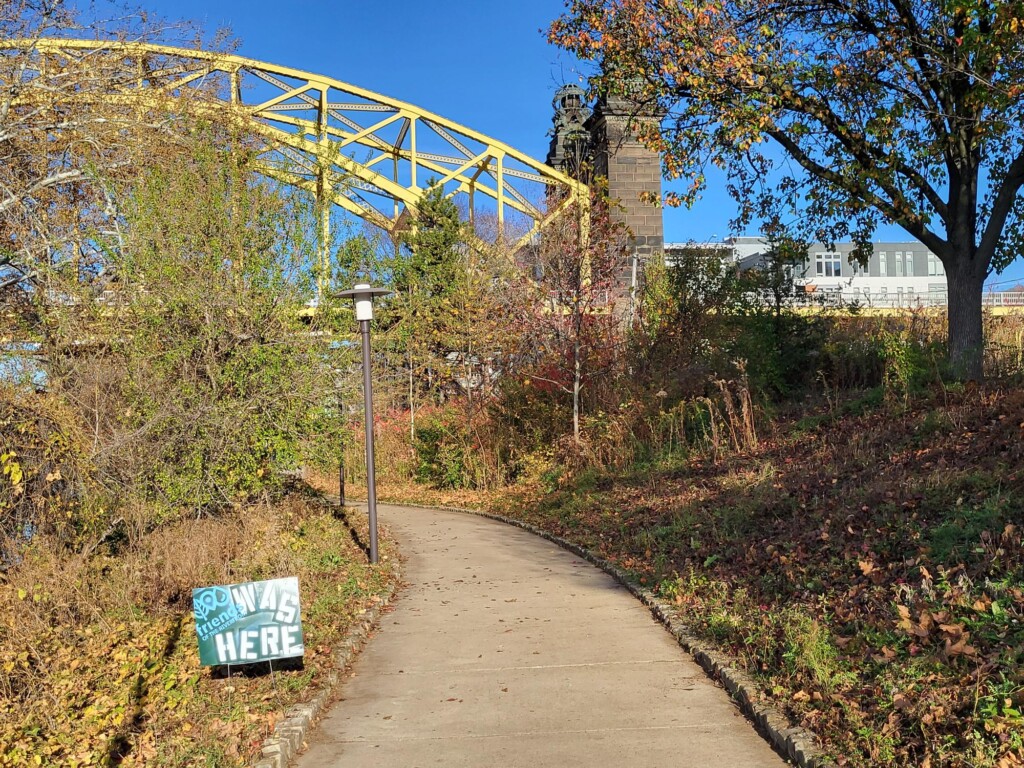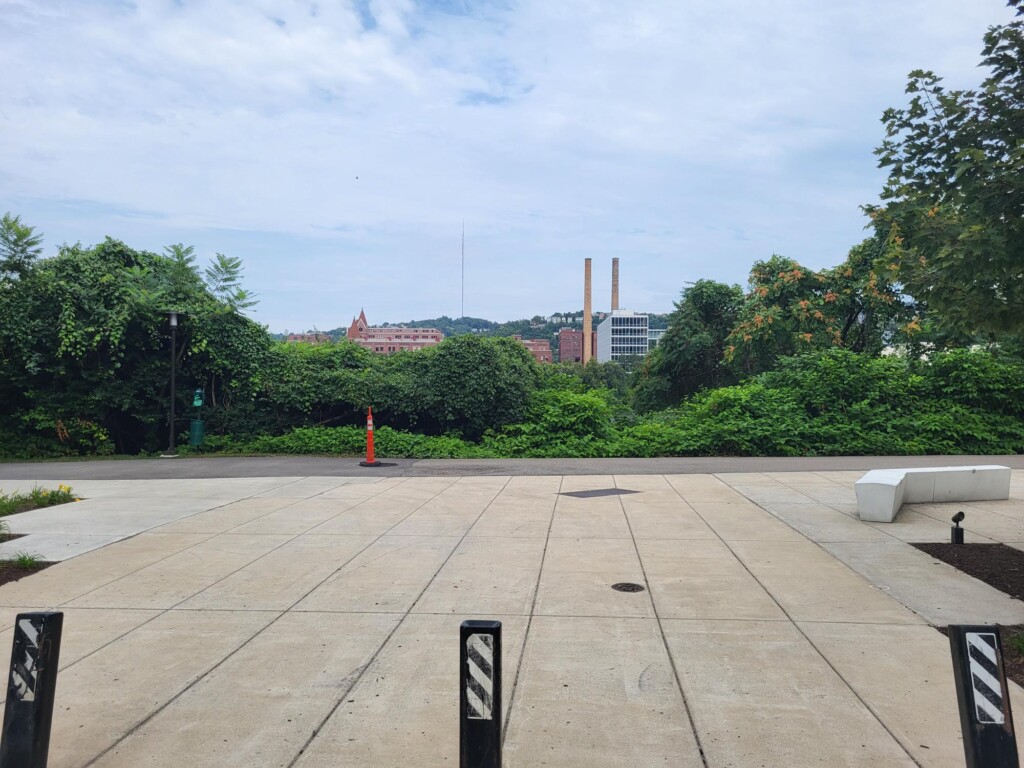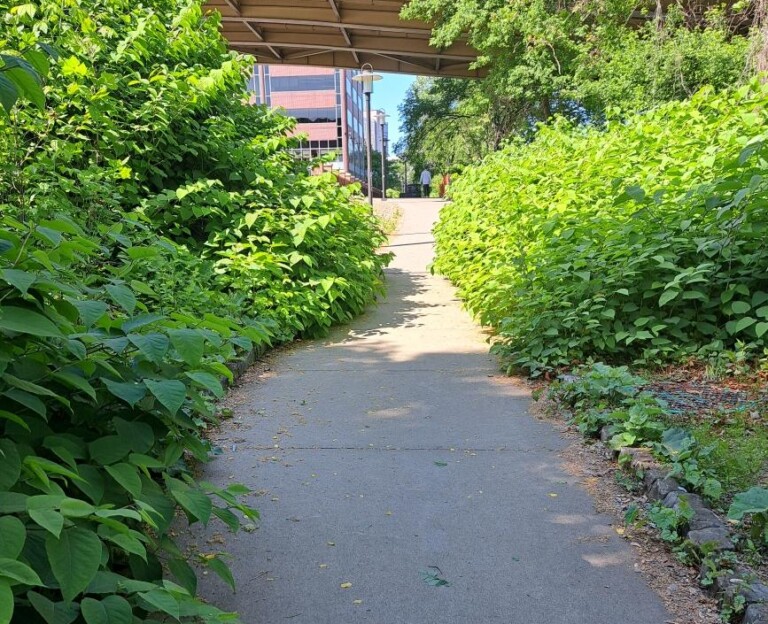Knotweed Suppression
(Updated August 2024) Since 1991, Friends of the Riverfront (Friends) has worked to protect and restore the riverfront in the Pittsburgh region through trail development and stewardship after decades of legacy pollution. The Three Rivers Heritage Trail now encompasses 35 miles of urban and suburban riverfront trails along both banks of the Allegheny, Monongahela, and Ohio rivers, as well as 31 launches of the Three Rivers Water Trail across Allegheny County. Through broad and diverse collaborations, we continue to work towards and promote environmental restoration, economic vitality, and public health benefits for Allegheny County and Southwestern Pennsylvania.
Friends Stewardship Team works to advance restoration plans at sites throughout the system, work that includes non-native invasive vegetation management. Unfortunately, mechanical methods have been unable to prevent the spread of Japanese Knotweed, an aggressive, non-native, invasive species in Pennsylvania (see PA Department of Conservation and Natural Resources fact sheet). Unchecked knotweed infestations result in decreased biodiversity in both plant and animal communities, degraded water quality, and damage to human infrastructure like roads, bridges, and trail surfaces.
Friends contracts with a permitted, licensed professional to perform targeted herbicidal suppression of Japanese Knotweed in select areas along the Three Rivers Heritage and Water Trails, including in 2024
- City of Pittsburgh: Strip District (secondary application following August 2023)
- City of Pittsburgh: Duck Hollow
- City of Pittsburgh: Marshall Shadeland
- Sharpsburg Borough
- Baldwin Borough
The objectives are to:
- Regain control of riverbank sites allowing for intentional riverbank restoration projects,
- Promote a native and balanced biodiversity of plants and wildlife,
- Restore native understory and tree canopy through volunteer planting projects
- Reduce damage to infrastructure and maintenance costs for the City of Pittsburgh and other municipalities
- Improve viewsheds of the Allegheny, Monongahela, and Ohio Rivers


Frequently Asked Questions
Is herbicide necessary?
Japanese knotweed stands are extremely resilient and can persistently withstand mechanical removal attempts. While not preferred, targeted and intentional herbicidal application is the most effective method of enacting lasting suppression. Unchecked knotweed infestations result in decreased biodiversity in both plant and animal communities, degraded water quality, and damage to human infrastructure like roads, bridges, and trail surfaces. Friends has consulted with a number of partners including Penn State Extension, environmental nonprofits, City of Pittsburgh, local municipalities, and trail adjacent building owners.
What plant species is being targeted?
Japanese knotweed (Reynoutria Japonica) is a rhizomatous, herbaceous perennial native to East Asia. It was introduced in the late 1800s to stabilize streambanks and hillsides. Knotweed is a highly successful invader of wetlands, stream corridors, forest edges, and drainage ditches across the country. Learn more about this species from Penn State Extensions.
What type of herbicide is being applied?
The application will rely on an aquatic-registered product with a glyphosate based using an oil-based carrier mixed with water to create a thin invert emulsion. The treatment is applied to the knotweed by backpack sprayer and absorbed by targeted plants. Herbicide contacting the soil will bind to clay and organic matter particles and will not leach or run-off. If the soil runs off, the herbicide will remain bound to soil particles and is short-lived in the water column.
Where is the treatment happening in 2024?
- City of Pittsburgh Strip District 11th Street to 18th Street
- City of Pittsburgh Duck Hollow between Homestead Grays Bridge and Glenwood Bridge
- City of Pittsburgh: Marshall Shadeland between Preble and Doerr Streets
- Sharpsburg Borough: Water Trail Launch at James Sharp Landing
- Baldwin Borough: Baldwin Riverfront Park
Is the application harmful to humans, animals, plant life, or the river?
Applied properly, the treatment will not pose appreciable risk to people, pets, plant or river life. Glyphosate will be present at a very low concentration. Non-contacted plants are not affected, as the application is not root absorbed after contacting the soil. Additionally, glyphosate is non-volatile and will not vaporize from treated surfaces. The application will be targeted and contained, with the applicator treating targets from a few feet away with a backpack sprayer. Learn more about herbicide use from Penn State Extensions.
Who is performing the application?
The applicator is Art Gover, the proprietor of Fruittown Land Stewardship Services. Prior to starting his own land stewardship company in 2008, Art worked at Penn State Extension from 1985 to 2021 specializing in weed management in non-crop areas. He has conducted knotweed research and control demonstrations since 1993 and has engaged in large-scale operational projects on public state lands including Ohiopyle State Park and Raccoon Creek State Park.
Why is this happening in late summer?
The sites to be treated were grazed by Allegheny Goatscape and trimmed by Friends volunteers this summer and are intended to regrow at least eight weeks prior to treatment. This results in shorter regrowth that is easier to treat and requires less herbicide. In the late summer knotweed begins carrying nutrients from its leaves and stems to its root system, increasing efficacy of suppression applications.
Will there be more than one application?
The operational approach for knotweed suppression involves is at least two seasons of suppression, with two applications in season one and at least one in season two. The second application in season one serves to addresses misses in the initial application.
Will the knotweed grow back?
Friends will initiate a multi-step, intentional, restoration plan at the treated sites, of which herbicidal suppression is an initial step. Beginning in 2024, Friends will broadcast native cover crop planting to mitigate growth of undesired species, install low growth native understory plantings, and plant restoration trees to grow existing tree canopy. Throughout this work Friends will employ small-scale, limited suppression treatments on knotweed regrowth as necessary.
Who can I contact to learn more about FOR’s restoration plans in the Strip District?
Alex Toner, Director of Trail Stewardship, at alex@friendsoftheriverfront.or





